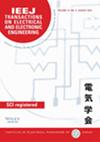Zhaoxuan Cui, Xin Lin, Jianying Zhong, Yongqi Yao, Jianyuan Xu, Zhijun Wang, Hao Zhang
求助PDF
{"title":"6σ Robust Lightweight Design of the GIL/GIS Bus Based on Co-Simulation of Insulation, Current Flow, and Mechanical Stress","authors":"Zhaoxuan Cui, Xin Lin, Jianying Zhong, Yongqi Yao, Jianyuan Xu, Zhijun Wang, Hao Zhang","doi":"10.1002/tee.24083","DOIUrl":null,"url":null,"abstract":"<p>GIL/GIS bus is widely used in the field of power transmission and distribution, and the demand for lightweight is becoming more and more prominent. To reduce the weight of the bus and ensure the safety and reliability of the structure, a new 6<i>σ</i> robust design method of the GIL/GIS bus based on electric-thermal-mechanical co-simulation is proposed. Taking a 550 kV/5000A bus as the initial structure, considering the uncertainty of product size and performance, a 6<i>σ</i> robust lightweight model of bus insulation electric field strength, current temperature rise, and mechanical stress multi-performance co-simulation is established. The finite element numerical calculation method is used to calculate and analyze the performance parameters of the bus. The Kriging surrogate model is used to form the response surface, and the optimal bus structure is obtained by genetic algorithm. The results show that after the robustness optimization, the performance of the bus meets the design requirements, the weight per meter decreased from 65.11 to 39.12 kg, and the lightweight effect is remarkable. Compared with the traditional deterministic optimization design, the reliability of the structure is improved. The new method of the GIL/GIS bus lightweight design proposed in this study has high feasibility and application prospects, which can provide new ideas for the development of gas-insulated electrical equipment. © 2024 Institute of Electrical Engineers of Japan and Wiley Periodicals LLC.</p>","PeriodicalId":13435,"journal":{"name":"IEEJ Transactions on Electrical and Electronic Engineering","volume":"19 8","pages":"1289-1299"},"PeriodicalIF":1.0000,"publicationDate":"2024-05-01","publicationTypes":"Journal Article","fieldsOfStudy":null,"isOpenAccess":false,"openAccessPdf":"","citationCount":"0","resultStr":null,"platform":"Semanticscholar","paperid":null,"PeriodicalName":"IEEJ Transactions on Electrical and Electronic Engineering","FirstCategoryId":"5","ListUrlMain":"https://onlinelibrary.wiley.com/doi/10.1002/tee.24083","RegionNum":4,"RegionCategory":"工程技术","ArticlePicture":[],"TitleCN":null,"AbstractTextCN":null,"PMCID":null,"EPubDate":"","PubModel":"","JCR":"Q4","JCRName":"ENGINEERING, ELECTRICAL & ELECTRONIC","Score":null,"Total":0}
引用次数: 0
引用
批量引用
Abstract
GIL/GIS bus is widely used in the field of power transmission and distribution, and the demand for lightweight is becoming more and more prominent. To reduce the weight of the bus and ensure the safety and reliability of the structure, a new 6σ robust design method of the GIL/GIS bus based on electric-thermal-mechanical co-simulation is proposed. Taking a 550 kV/5000A bus as the initial structure, considering the uncertainty of product size and performance, a 6σ robust lightweight model of bus insulation electric field strength, current temperature rise, and mechanical stress multi-performance co-simulation is established. The finite element numerical calculation method is used to calculate and analyze the performance parameters of the bus. The Kriging surrogate model is used to form the response surface, and the optimal bus structure is obtained by genetic algorithm. The results show that after the robustness optimization, the performance of the bus meets the design requirements, the weight per meter decreased from 65.11 to 39.12 kg, and the lightweight effect is remarkable. Compared with the traditional deterministic optimization design, the reliability of the structure is improved. The new method of the GIL/GIS bus lightweight design proposed in this study has high feasibility and application prospects, which can provide new ideas for the development of gas-insulated electrical equipment. © 2024 Institute of Electrical Engineers of Japan and Wiley Periodicals LLC.
6σ 基于绝缘、电流和机械应力协同模拟的 GIL/GIS 总线稳健轻量化设计
GIL/GIS 总线广泛应用于输配电领域,轻量化需求日益突出。为减轻母线重量,确保结构安全可靠,提出了一种基于电-热-机联合仿真的 GIL/GIS 母线 6σ 鲁棒设计新方法。以 550 kV/5000A 母线为初始结构,考虑产品尺寸和性能的不确定性,建立了母线绝缘电场强度、电流温升、机械应力多性能协同仿真的 6σ 鲁棒轻量化模型。采用有限元数值计算方法对母线的性能参数进行计算和分析。利用克里金代用模型形成响应面,并通过遗传算法获得最优母线结构。结果表明,经过鲁棒性优化后,客车性能满足设计要求,每米重量由 65.11 kg 降至 39.12 kg,轻量化效果显著。与传统的确定性优化设计相比,结构的可靠性得到了提高。本研究提出的 GIL/GIS 母线轻量化设计新方法具有较高的可行性和应用前景,可为气体绝缘电气设备的发展提供新思路。© 2024 日本电气工程师学会和 Wiley Periodicals LLC。
本文章由计算机程序翻译,如有差异,请以英文原文为准。

 求助内容:
求助内容: 应助结果提醒方式:
应助结果提醒方式:


